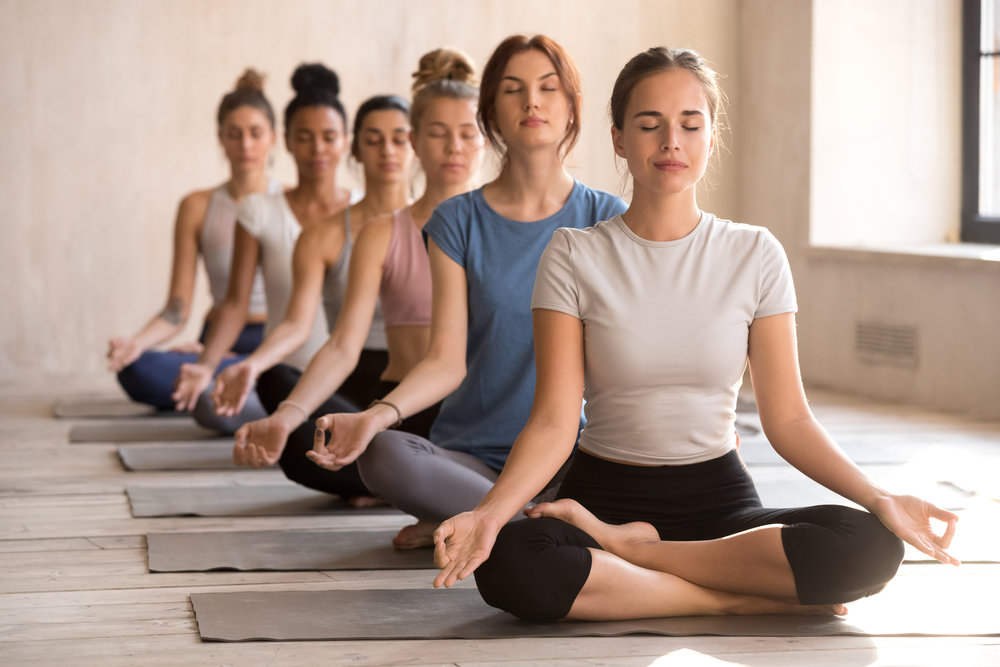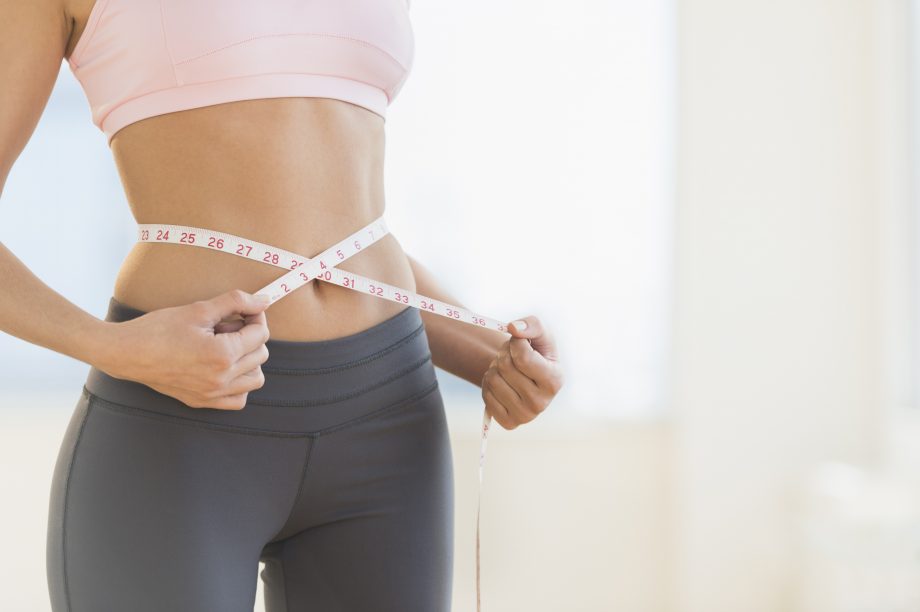Day-to-day, we get a lot of things done. We cross off to-do lists, then head to the gym or to school to pick up kids. A lot of people count on us, and we’re killing it!
Even so, a million frantic thoughts race through our heads. Did I unplug the iron before I left home? Will I indulge in my sugar craving at the nearest vending machine? Did I send that email to the right person? When my kid comes home and just picks at his food, is it because he’s sick? What if he has an incurable disease no one knows about? Were my glory days back in high school? What about my dream job, a huge promotion, or starting that passionate project once and for all? What about providing for my family and their dreams? I must pay rent. If I go for my dreams and they don’t pan out, i could end up homeless, bring shame to my family, become just another statistic…!
If any of this sounds familiar, you’re not alone. We all deal with some level of anxiety. Timeless flight- or- flight still functions. Today, though, the stress response is not related to our immediate survival. Our thoughts instead replace the bears, and we become paralyzed. Impending doom can seem all too real and close to home. It’s hard to even breathe.
The vacation we take from work, or even just a good night of sleep, usually helps put things in perspective. At least for a while. But the burdens persist. We may find ourselves turning to expensive medication or therapy sessions, anything to get through the day. But are these standard options the only way to go about dealing with daily mental health issues?
A look into Yoga
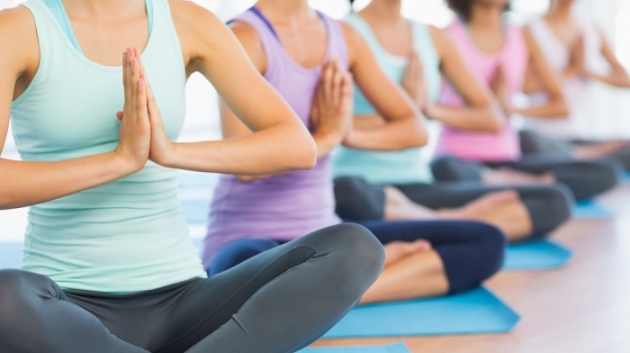
The medical community in general is skeptical about any healing benefits of yoga. The main issue being that there has been insufficient research comparing yoga to other sports or relaxation. “While they point to research showing that yoga can indeed improve health, nothing appears to suggest such benefits could not be had through walking, swimming or other exercises and sports.” This is a concern that lingers even today.
However, when it comes to treating mental health issues, one study 2 years ago – the first meticulous research of its kind in the United States – suggested that yoga could be an effective therapy option for patients’ where standard treatments fail. “We aimed to recruit individuals for whom conventional care may offer uncertain benefit,” .
One group met twice a week for 8 weeks for 90-minute hatha yoga sessions and the other group watched yoga lectures for the same period. Hatha combines physical poses (asanas) with controlled breathing and ends with a short deep relaxation period. Both groups were measured on mood before and after the period. The results? “Statistically and clinically significant reductions in depression severity.”
Yoga being this effective for major anxiety and depression means, then, that yoga is indeed far better than other exercise, sport, or generalized relaxation at healing people. This also means that spending some mat time will also work for those of us struggling through daily stressors and emotional lows!

And it makes sense. If you’ve ever done yoga, you know how calming it can be. Continual practice teaches people to be centered, accepting of themselves, and more confident. “Classical yoga practice encourages compassionate, non-judgmental acceptance of one’s limitations and honoring of one’s life essence, thereby having potential to improve self-esteem,”. When we think about people being hunched over and closed-in on themselves, specific yoga poses expand areas of the chest, back, and shoulders. We divide our attention between holding and stretching and breathing calmly throughout (especially in balancing) poses. There’s not much space left to worry about unplugged irons. In these ways, “Yoga can have a positive effect on the parasympathetic nervous system and aid in lowering heartbeat and blood pressure… Effective use of this practice can also reduce the chances of stress culminating in anxiety and depression.”
There are over 300 known yoga poses – These are great ones for mental health
For those of us who struggle through daily mild anxiety, experiment with yoga and see if symptoms improve. Yoga is easily accessible, and free, for all levels. There are no side effects (as there can be in medication). A beginning regiment of 6-poses can be found online. You can tailor your practice to the level you are comfortable with by conducting appropriate searches. Not all flows are good for stress relief; you wouldn’t want to do a heart-pumping power yoga session just before heading out to work. Also, when you don’t have time for a full restorative hatha session, these 2 poses practiced consistently can still impart a lot of benefits. You don’t have to be a wise guru to do these poses. They can be done by anyone, no matter how flexible.
1. Forward Bend
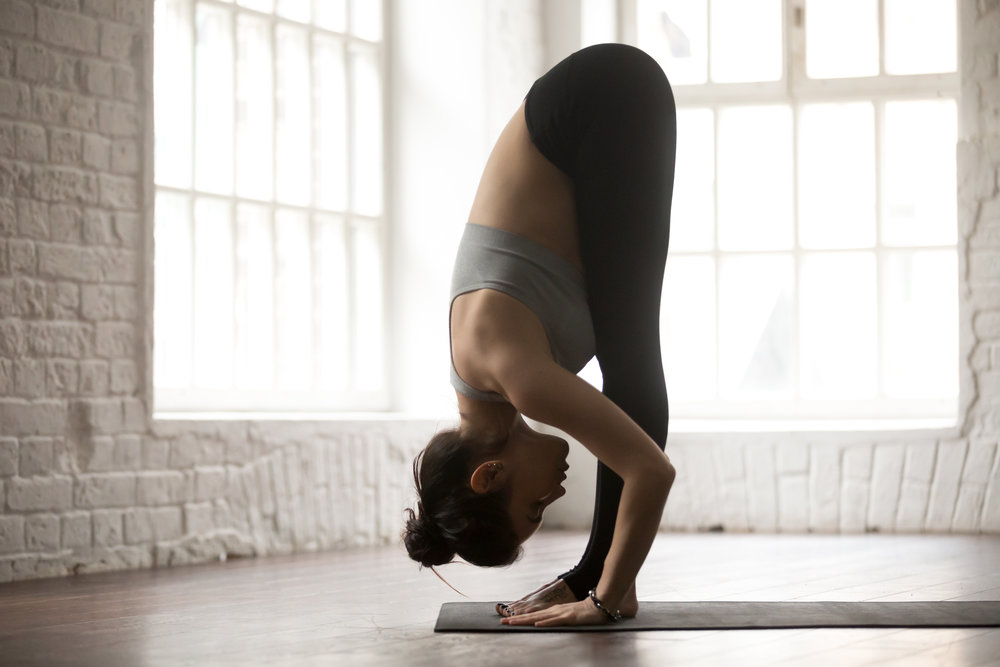
The science: “It releases tension in the shoulders and neck while calming the nerves and reducing stress.”
The Pose:
Standing:
Stand with feet hip-width apart. Inhale, bringing arms up over head. Exhale, folding down at the waist, taking arms out to the side. Let hands rest on shins or ankles, relaxing your neck. Slowly straighten knees and walk hands down to the floor or as far as you can stretch. Close eyes and take long, slow, deep breaths through the nose. Hold for several minutes. To reset out of the pose, straighten from the waist, one vertebra at a time, the head the last thing to come up.
Sitting:
If standing is too straining to start with, sit cross-legged, propped up so that when you fold forward, your forehead comes to rest comfortably on a cushioned chair seat. Rest your arms over your head on the chair. Breathe the same way as in the standing version.
2. Legs up the Wall (Inversion)
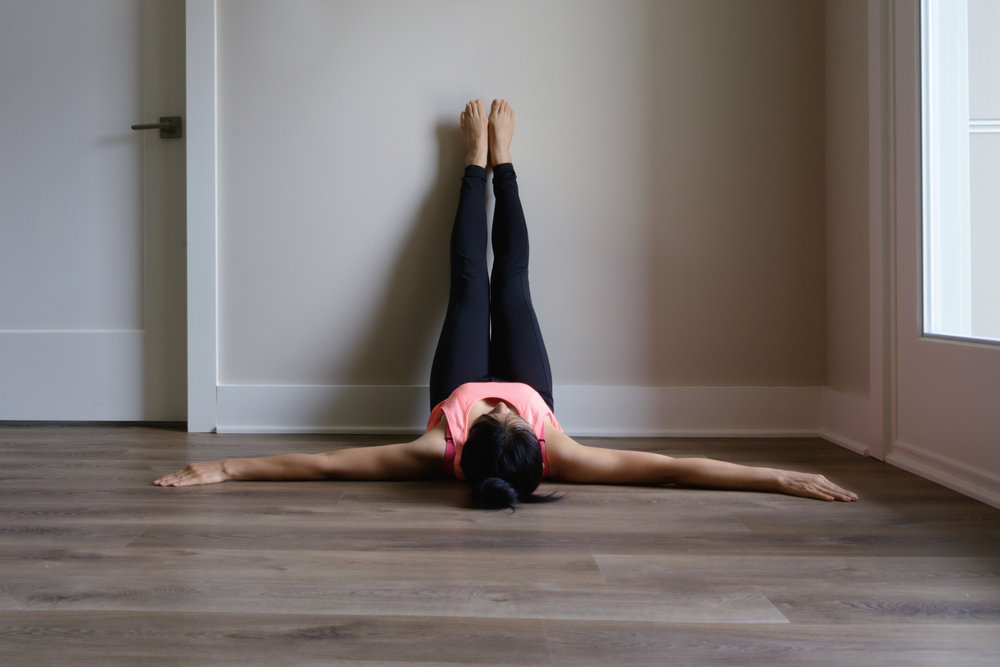
The science:
The Pose: Find a wall, place a mat by it, and sit on the mat on the floor with your glutes propped up against the wall. Extend your legs upward so the thighs, calves, and heels all press against the wall. Arms rest by the sides, eyes close, and breaths are taken slowly and deeply for several minutes. To reset out of the pose, bend your legs so your feet push against the wall, separating you from the wall. Then tuck knees to chest and roll onto a side. In performing these poses, don’t try to power through them or compete with your mat neighbors. Remember, our ambitious and competitive nature is the seed of our anxiety. Compete instead with how much you can slow down the poses, how deep your breaths can be in each posture. “This slower-paced yoga triggers the parasympathetic nervous system, causing your flight-or-flight stress response (the same reaction you’d have to seeing a bear in the woods) to fall away. In this tension-free place, you’ll experience and expansiveness that will allow you to let go. Your muscles soften, your breathing slows.”
For specific breathing exercises (or pranayama) that can accompany these poses or be used on their own, check out our article here.
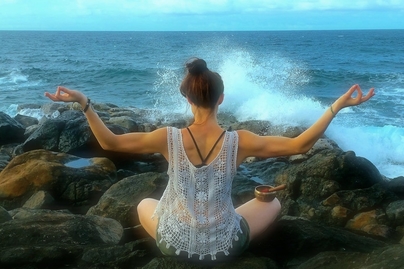
Both poses only take a few minutes out of the day, are free, and can even be incorporated into daily life. Whenever we catch our minds starting to spiral into anxious mode, we can choose to pause, take a few short stretches and a deep breaths, whatever the situation allows (your coworkers may look at you funny if you try putting legs up against walls).
Yoga is a more sustainable and natural way of dealing with mental health issues than standard treatments. People can retake the power in their lives, confidently learning skills to manage emotional issues, cope, adapt, and overall be well. Yoga trains us to realize we are more than our momentary thoughts, more than our vulnerable feelings. When we can’t afford a vacation, sleep eludes us, and we think we’re going to go crazy, with yoga we know we still got this.
